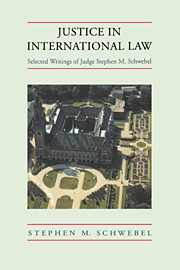Book contents
- Frontmatter
- Contents
- Preface
- PART I International Court of Justice
- PART II International Arbitration
- 10 Arbitration and the Exhaustion of Local Remedies (with J. Gillis Wetter)
- 11 Arbitration and the Exhaustion of Local Remedies Revisited
- 12 Some Aspects of International Law in Arbitration Between States and Aliens
- 13 The Majority Vote of an International Arbitral Tribunal
- 14 The Prospects for International Arbitration: Inter-State Disputes
- PART III United Nations
- PART IV International Contracts and Expropriation
- PART V Aggression under, Compliance with, and Development of International Law
- List of publications
- Index
12 - Some Aspects of International Law in Arbitration Between States and Aliens
Published online by Cambridge University Press: 06 November 2009
- Frontmatter
- Contents
- Preface
- PART I International Court of Justice
- PART II International Arbitration
- 10 Arbitration and the Exhaustion of Local Remedies (with J. Gillis Wetter)
- 11 Arbitration and the Exhaustion of Local Remedies Revisited
- 12 Some Aspects of International Law in Arbitration Between States and Aliens
- 13 The Majority Vote of an International Arbitral Tribunal
- 14 The Prospects for International Arbitration: Inter-State Disputes
- PART III United Nations
- PART IV International Contracts and Expropriation
- PART V Aggression under, Compliance with, and Development of International Law
- List of publications
- Index
Summary
Introduction
As an international lawyer who has had the good fortune to grapple with the body of international law in a number of its extensions – as a student, teacher, lawyer at the bar and in the State Department, member of the United Nations International Law Commission, and most lately, in a judicial and an arbitral capacity – I have been recurrently struck over some thirty-five years by the interplay between principles of public international law and the practice of international arbitration. Naturally international law is intert-wined with arbitration between States, for that is so much of the stuff it is made of. But it is also involved in international commercial arbitration – not, typically, in arbitration between two private parties, but in arbitration between States and aliens.
That measure of involvement is important in a field which is important. How important is the field is indicated by the number of arbitration cases on the docket at any one time of the Court of the International Chamber of Commerce (ICC). The ICC these years has a few hundred cases in progress at any one time, and, of those, a strikingly large percentage – on the order of a quarter, I understand – is between States or State agencies on the one hand, and aliens on the other. These cases are among the largest and most complex of those which the ICC handles. Moreover, there are not infrequent, and important, ad hoc arbitrations between States and aliens.
- Type
- Chapter
- Information
- Justice in International LawSelected Writings, pp. 196 - 212Publisher: Cambridge University PressPrint publication year: 1994



